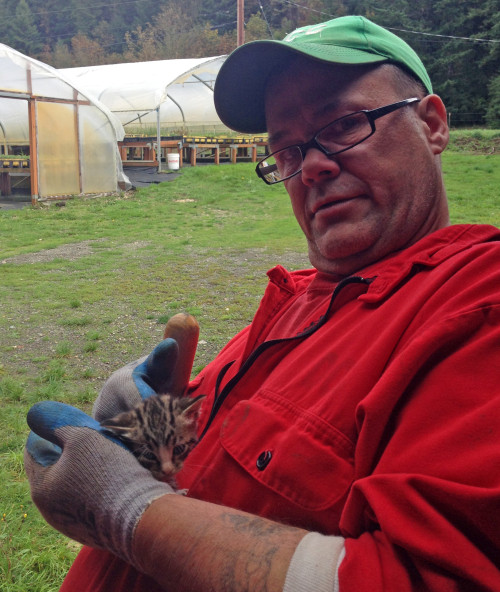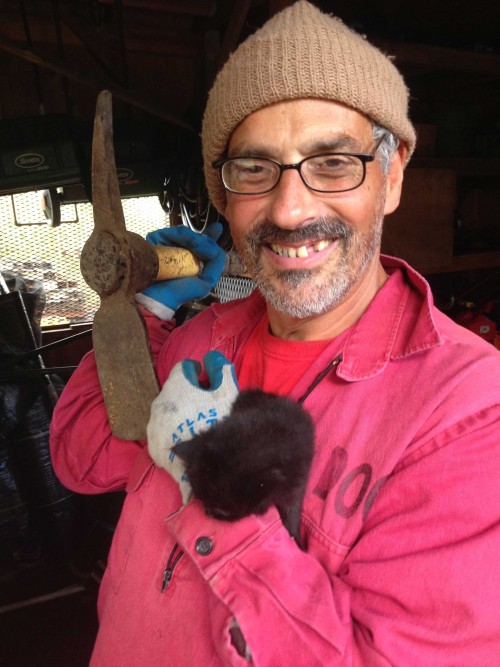By Erica Turnbull, SPP Summer Intern
Spending 11 weeks working in prison might not sound appealing to everyone but as a Rehabilitation and Social Justice major at Western Washington University, I could not have been more excited to be accepted by the SPP team as their summer intern.
Starting my internship with an overview of SPP, I was invited to visit and participate in programs at four prisons (Stafford Creek, Cedar Creek, Mission Creek, and Washington Corrections Center for Women). In time, most of my volunteer work took place at Stafford Creek Corrections Center (SCCC) and Cedar Creek Corrections Center (CCCC).

Inmates participating in the educational lecture held at SCCC. Photo by Erica Turnbull.
SCCC holds educational lecture once a month with guest speakers. At the lectures, inmates can learn about sustainability and have time for Q&A with the presenter. I made educational handouts for the inmates to take with them and helped do data entry to track program success and inmates’ environmental interest. Also at SCCC, SPP Graduate Research Assistant, Drissia Ras, and I worked in the greenhouses where inmates are growing endangered native prairie plants. Once a week we spent a day counting germination successes, controlling pests, and maintaining the plants as they transition through their life cycle.
At CCCC I took over the gardening project from Sophie Hart, a former SPP volunteer. I enjoyed tremendous help from recent Evergreen Environmental Studies graduate Katie Wolt. Together we helped the inmates compile seasonal crop lists, talked about the importance of crop rotation to replenish soil nutrients, and planted flowers with natural healing properties that double as pest controls by attracting natural predators to control the overabundant aphid population. Our biggest project was collaborating with the inmates to start amending the soil in the newly established orchard.

Vegetable garden at CCCC. Photo by Erica Turnbull.
Also I was invited by staff to participate in the Roots of Success program with SPP Graduate Research Assistant Rachel Stendahl and Correctional Industries’ Lucienne Guyot. It was great to see the gardening crews in a classroom setting where we could talk about job skills development and planning for re-entry.
I was also cordially invited to attend the Redemption Program; a safe place for inmates to share their past, set goals for the future, and help each other develop and achieve positive change within them.

Two inmates on the gardening crew at CCCC, taking a break from amending the soil in the prison’s orchard. Photo by Erica Turnbull.
I have noticed that a number of inmates are very passionate about self-betterment and helping others succeed as well. Several inmates have spent the majority of their adult lives in prison. From what I have observed, punishment t
hrough incarceration does not appear to have as much positive and lasting impact on inmates as programs, opportunities, and the encouragement of others. A positive and safe context allows inmates to understand how past actions led them to where they are now and what changes they can make to grow and move forward. Personal growth allows them to create productive goals and foster hope in themselves and others.
Developing trust through consistency is also important. Inmates needed to know they could rely on me to come when I said I would, order project supplies, etc. Spending just a few hours with the inmates every week lets them know someone cares and is as dedicated to the projects as they are. The inmates I worked with value interactions with people from outside the gates. They also value working outdoors with nature; I heard several inmates express the hope and tranquility it brings.

Roots of Success class at CCCC. Photo by Erica Turnbull.
From what I have noticed, SPP programs bring out a number of strengths in the inmates. Programs require and encourage responsibility, reliability, timeliness, communication, teamwork, and help foster patience which leads to calmer dispositions.
This is an amazing project! I have learned and grown so much through this experience. I want to thank my WWU supervisor, Charles Sylvester, as well as my SPP supervisor, Brittany Gallagher, for having patience. The whole SPP team flooded me with unending support throughout and beyond my internship. I would like to give a special thanks to Charlie Washburn, CCCC Programs Manager, Kim Govreau, CCCC Volunteer Coordinator, and Katie Wolt, SPP volunteer, for their knowledge, encouragement, and guidance. Lastly, a thank you to all the officers who never failed to maintain safety and keep a positive attitude!

Inmate with his son sitting in a firetruck at the CCCC’s children’s back to school fair. Photo provided by Kim Govreau.
I look forward to working in this field now more than ever and am excited to see what new programs SPP has in store!






























